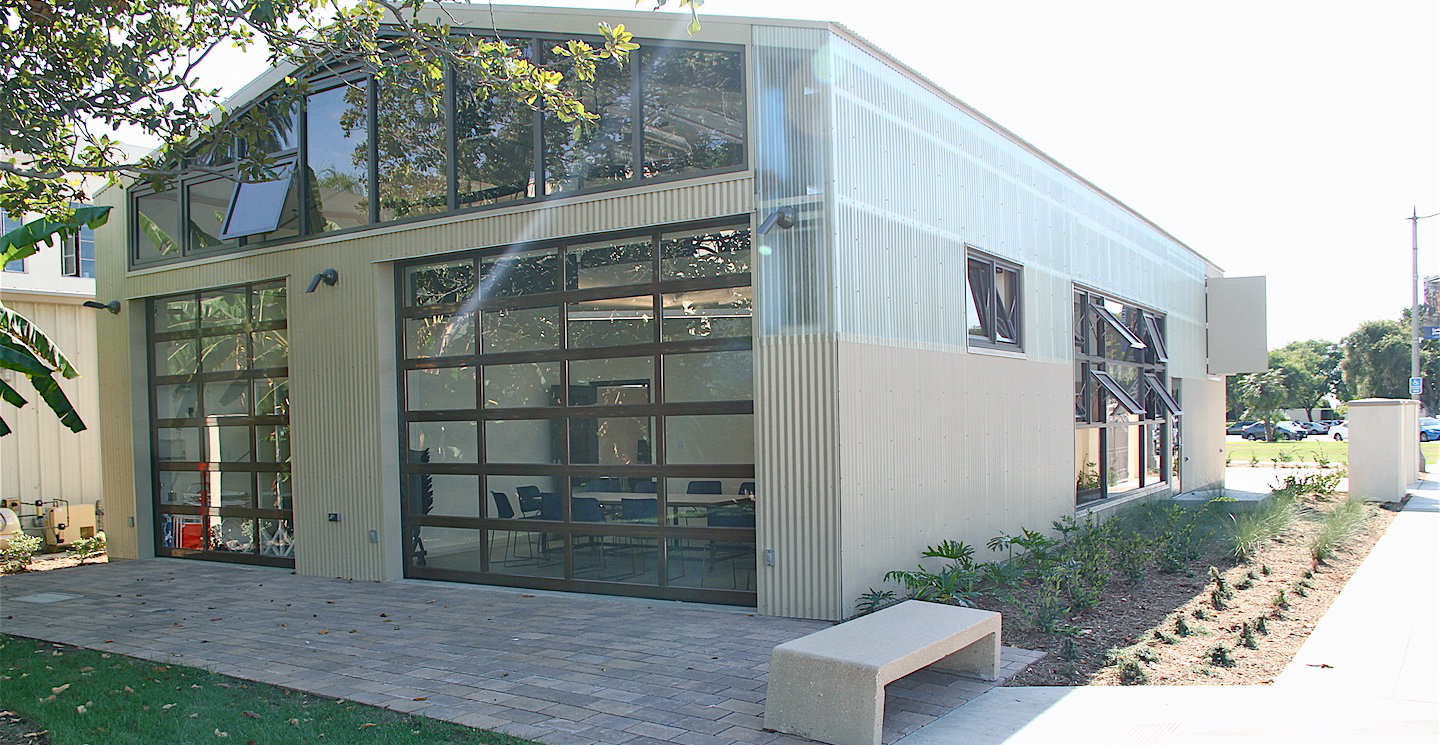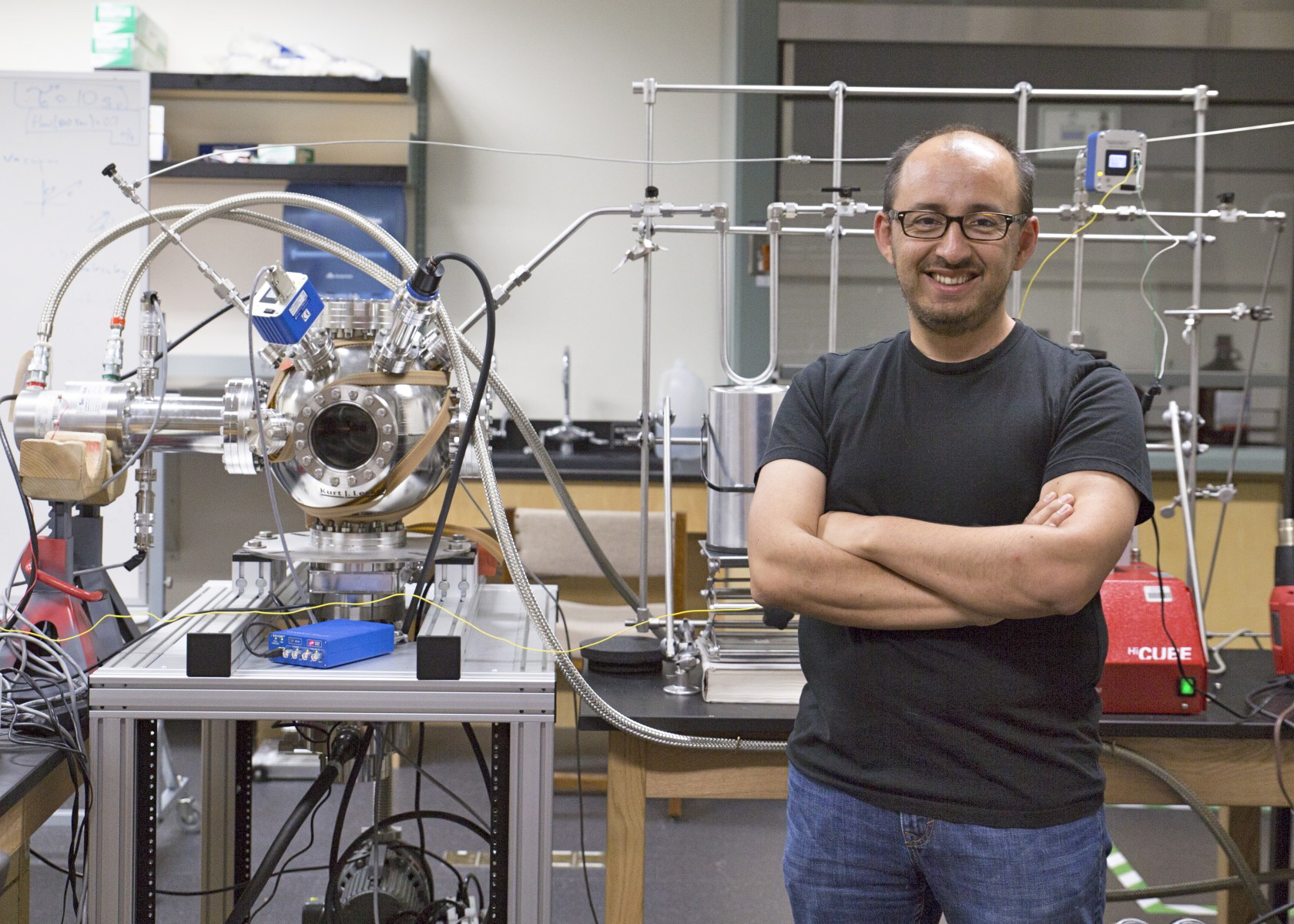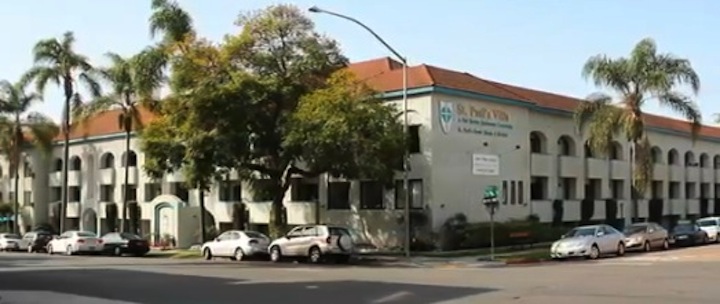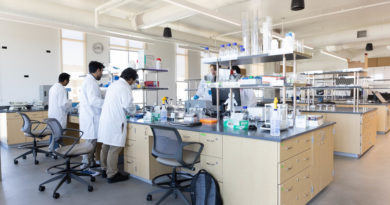Daily Business Report-Oct. 5, 2016
Associate Professor of Physics Gerardo Dominguez is the project director for the grant. (Photo courtesy of CSUSM)
Big Grant Puts Cal State San Marcos Step
Closer to Launching Engineering Program
Cal State San Marcos is a step closer to launching an engineering program thanks to a nearly $6 million grant received from the U.S. Department of Education.
The five-year grant — from the Hispanic-Serving Institutions STEM Program — will provide nearly $1.2 million each year beginning this month.
“This grant is a significant first step toward launching our engineering program,” CSUSM President Karen Haynes said. “Over the next several months we will be working to secure the necessary private sector funding that will allow us to bring the program to reality.”
Gerardo Dominguez, an associate professor of physics at CSUSM, is the project director for the grant, which is titled “Si Se Puede!” to Close the Equity Gap in Engineering Degree Completion.
“I’m thrilled that this proposal has been chosen and I am excited about the possibilities that this brings to the campus community,” Dominguez said. “It will increase the professional and education opportunities for the residents of North County and the broader area served by CSU San Marcos. I am particularly excited that the funding provided by this grant will allow CSU San Marcos to start offering engineering options for our students in the near future.”
The purpose of the grant is to develop and carry out activities to improve and expand CSUSM’s capacity to serve Hispanic and low-income students.
The project’s goals include developing innovative degree programs in software engineering and electrical engineering; developing the engineering curriculum and transfer pathway between community college partners and CSUSM; and building and supporting an educational ecosystem focused on equitable student success and completion through best practices.
_______________________
Accion San Diego Awarded $1 Million
To Bolster Loans to Low-Income Clients
Accion, a San Diego-based nonprofit microlender, was awarded a $1 million grant from the U.S. Department of the Treasury’s Community Development Financial Institutions (CDFI) Fund to serve low-income people and communities that lack access to affordable financial products and services.
It is the largest CDFI Fund grant that the organization has ever received, having been awarded $880,000 in 2014. It is also the single largest financial contribution received in the organization’s 22-year history.
“We are so pleased to be recognized by the U.S. Department of the Treasury through this award,” said Accion CEO Elizabeth Schott. “We look forward to continuing to strengthen the roots of underserved communities by providing essential capital to local entrepreneurs who may not be able to obtain it otherwise. This $1 million grant will enable us to reach more business owners than ever before.”
The fund will be used for loan capital, which will be deployed in two of the counties in Accion’s service area, San Diego and Imperial. Accion was one of two organizations in San Diego County to receive the award and the only Imperial County nonprofit to receive funds from CDFI.
Two other members of the Accion U.S. Network were also awarded grants from the CDFI Fund:
- Accion, based in New York City, received $1.75 million.
- Accion, based in Albuquerque, N.M., received $2 million.
_______________________
Federal Grant to Scripps Research
Institute Expands to $207 Million
Scripps Research Institute has been awarded an additional $87 million from the National Institutes of Health for a greater role in its Precision Medicine Initiative.
The award marks a significant increase in scope from the initial award announced in July and provides additional details about the network of partners in the TSRI-led consortium. The action expanded a five-year funding award to the institute from $120 million to $207 million.
“The size of this award underscores the critical nature of this research in improving our ability to prevent and treat disease,” said TSRI President Peter Schultz. “We are thrilled to be part of such a major undertaking and look forward to supporting Dr. Eric Topol in leading this unprecedented project.”
Topol, who is director of the Scripps Translational Science Institute, professor of genomics at TSRI and chief academic officer at Scripps Health, will direct the award as part of the PMI Cohort Program, which seeks to engage one million or more U.S. participants in a historic medical research effort aimed at improving the ability to prevent and treat disease based on individual differences in lifestyle, environment and genetics.
_______________________
California Awarded $844,214 to Boost
Export Growth for Small Businesses
The U.S. Small Business Administration announced an award of $844,214 to California to support export growth among small businesses. The funding was awarded through SBA’s competitive State Trade Expansion Program (STEP). The California funding was part of an $18.85 billion nationwide grant program.
“Exporting provides tremendous opportunities for America’s small businesses and entrepreneurs,” said SBA Administrator Maria Contreras-Sweet. “Two-thirds of the world’s purchasing power can be found outside of the United States, but only about one percent of America’s 28 million small businesses are reaching customers beyond our borders. Exporting is an important growth opportunity for our small businesses that are ready to expand their reach into new and increasingly borderless global markets.”
These awards are granted to U.S. states and territories to support programs that help small businesses expand their export-related activities.
_______________________

Rob Quigley Designs Pavilion
to Expand USD Architecture Program
A new pavilion, designed by award-winning architect Rob Quigley in collaboration with University of San Diego students, will add studios, seminar and exhibition space to the university’s architecture program.
“The Architecture Pavilion will allow our students to design and build on a much larger scale,” said Juliana Maxim, USD associate professor and Architecture Program director in the Department of Art, Architecture + Art History. “Our students were also thrilled to work with a world-class architect like Rob Quigley on the project’s design.”
An opening celebration for the Architecture Pavilion will take place Friday from 4:30 to 7 p.m. on the patio behind Camino Hall.
Built with a pre-engineered steel structure and simple materials, the 2,100-square-foot pavilion includes indoor-outdoor studio spaces and seminar room, all under natural, filtered light. The flexible environment can be easily transformed to allow for lectures and exhibitions, expanding the range of public events the program can host.
“All this is key to the identity and larger regional presence of our architectural program,” Maxim said. “Our goal was to achieve multi-functionality and sustainability with simple means.”
“It was a delight to work with creative students to achieve this unusual building,” Quigley said. “The new Pavilion leverages San Diego’s benign climate to expand the utility of the structure. Large overhead doors open to the central courtyard and also the tree shaded east lawn for expanded programs and interaction. The building is an instructional model of passive environmental design. Soft, natural daylighting floods the interior. Oversized ceiling fans circulate the air and special manually operated ‘air scoop’ windows channel the afternoon breezes thru the space.”
_______________________
Moores Cancer Center Joins
Initiative to Tackle Pancreatic Cancer
The Moores Cancer Center at UC San Diego Health has been selected as one of 12 clinical trial sites for the Pancreatic Cancer Action Network’s newly created Precision Promise, the first large-scale precision medicine trial network designed to transform outcomes for patients with pancreatic cancer.
“Precision Promise is a clinical trials network that will provide patients with access to trials rooted in science that are tailored to each person,” said Dr. Andrew Lowy, chief of the Division of Surgical Oncology at Moores Cancer. “Every possible patient with pancreatic cancer should be enrolled in a clinical trial because standard treatments are not enough. Precision Promise will offer a trial for every patient.”
Nationally, only 4 percent of patients with pancreatic cancer enroll in clinical trials. To address this, Precision Promise is bringing together leaders in the field, including clinicians, researchers and drug developers, and is putting the patient at the center of every decision to advance the Pancreatic Cancer Action Network’s goal of doubling survival by 2020.
The network will allow researchers at all 12 clinical trial sites to evaluate the success of each other’s patients as they progress through treatment. If a treatment is not effective in an individual, the team will have access to the latest tissue samples that can be studied to determine why that person did not respond to a therapy.
_______________________

Voter Registration Deadline
Coming Up on Oct. 24
The San Diego County Registrar of Voters is sending courtesy postcards to two groups of county voters in an effort to reduce unnecessary provisional voting at the polls on Nov. 8. One is going to approximately 20,000 mail ballot voters whom Postal Service records show have recently moved but have not re-registered. They will be receiving a postcard reminding them to complete a new registration form with their new home address. If they do not, they might not receive their mail ballot or voting information. They may also need to vote provisionally if they show up at their poll on Election Day.
The other postcard aims to help about 30,000 mail ballot voters who voted provisionally in the June election avoid that happening again on Nov. 8. If you vote by mail, the Registrar encourages you to vote and return that ballot promptly through the mail.
Postcards will begin showing up in mailboxes this week. For more information, visit sdvote.com or call (858) 565-5800.
_______________________
Workshop for Warriors Receives
$50,000 Grant from Boeing
Workshop for Warriors, a nonprofit school providing veterans free training in machining and welding, announced it received a $50,000 grant from Boeing.
The organization said the grant is crucial in allowing Workshops for Warriors to support workforce development by providing quality training, accredited STEM educational programs and opportunities to earn third-party nationally recognized credentials.
“Boeing is not only the leader in the Aviation and Aerospace, but they are big supporters of programs like ours that enhance STEM, workforce training, and educational and career pathway opportunities for Veterans,” said Hernàn Luis y Prado, founder of Workshop for Warriors.
Founded in 2008, the organization offers classes in CNC machining, CAD/CAM programming and welding. Between 2011 and 2015, Workshops for Warriors trained more than 200 veterans and wounded warriors.
_______________________
Chargers Stadium Would Bring
Economic Boost, Study Claims
By City News Service
A Chargers stadium and convention center annex being proposed under Measure C would be an economic boost and bring an array of benefits for San Diego workers and residents, according to a study released Tuesday by two local economists. The study was panned by Measure C opponents.
The team-funded study was authored by Alan Gin, an associate professor of economics at the University of San Diego, and Murtaza Baxamusa, director of planning and development for the San Diego County Building and Construction Trades Council Family Housing Corporation.
“The Chargers gave us complete freedom to do our research over the summer months and to come to whatever conclusions we believed were warranted,” Gin said. “The study we are releasing today is the result of three months of intensive work by Dr. Baxamusa, our research assistant Kelly Allende and me.”
The study found that the project, if approved by two-thirds of voters in November, would create 15,000 construction jobs and 6,400 permanent jobs. Regional economic output was projected to increase by $1.2 billion, while labor income would be increased by $1.2 billion.
The San Diego County Taxpayers Association released a statement with a different view.” Study after academic study over a quarter century have all reached the same conclusion — football stadiums do not foster economic development. They are not good for the tax base,” SDCTA President and CEO Haney Hong said. “Urban theorist Richard Florida recently put it this way: ‘The overwhelming conclusion of decades of economic research on the subject is that using public funds to subsidize wealthy sports franchises makes zero economic sense and is a giant waste of taxpayer money.’”



